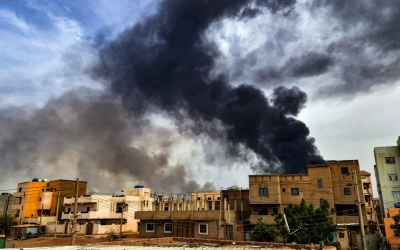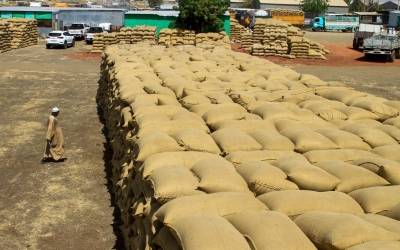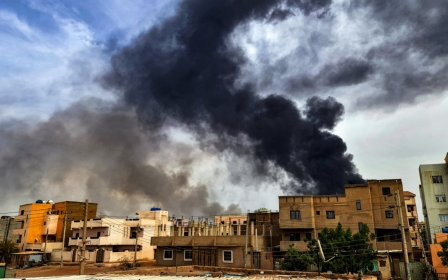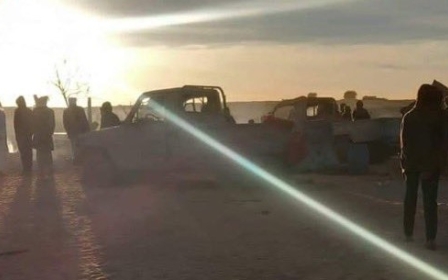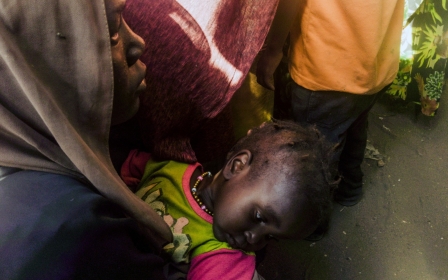Sudan: Horror in el-Gezira as RSF invasion prompts widespread abuse
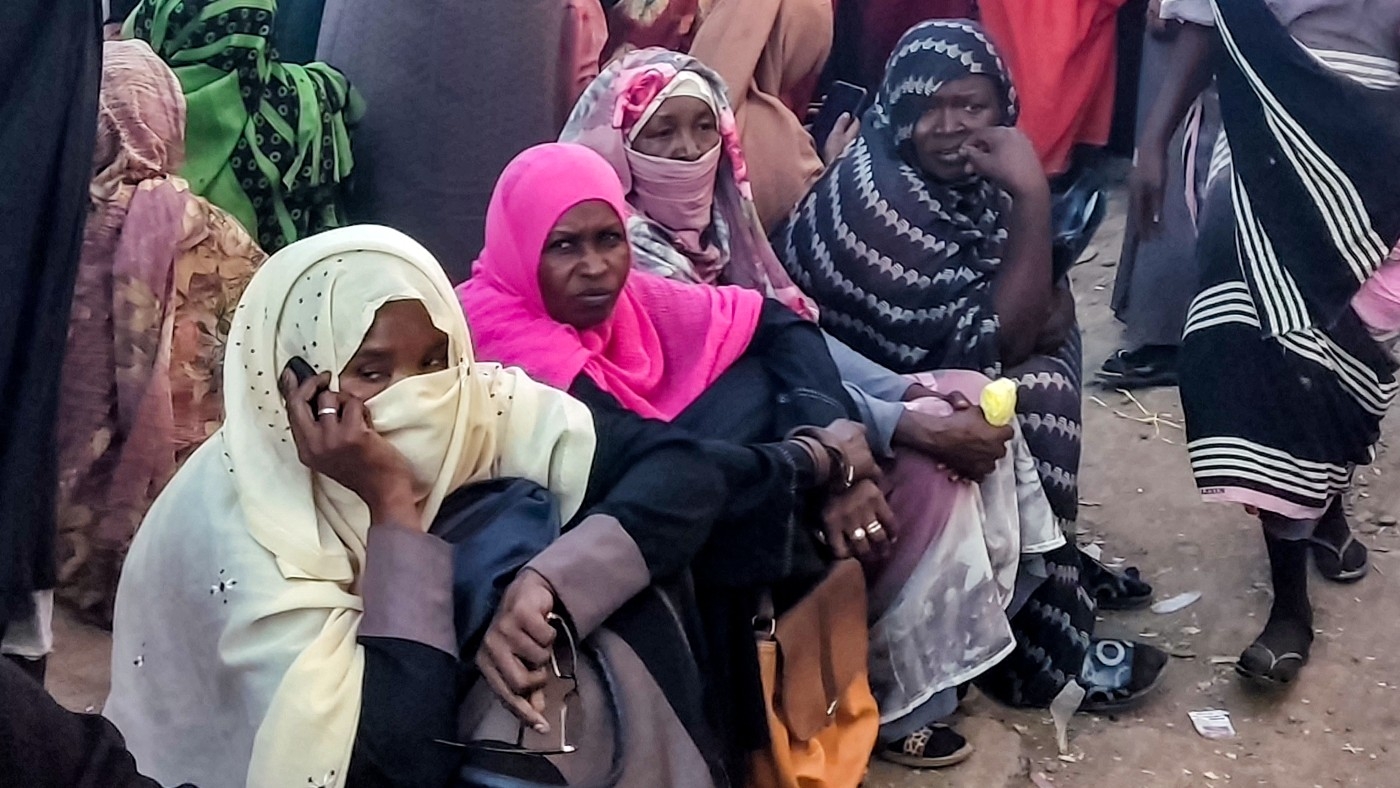
The atrocities in Sudan's el-Gezira are taking place under the cover of an internet blackout.
In December, Sudan’s paramilitary Rapid Support Forces (RSF) stormed into el-Gezira state, scattering already displaced civilians and the retreating Sudanese army before it as it took control of the country’s second-largest city, Wad Madani.
Since then, according to eyewitnesses and local activists, RSF fighters and unaffiliated criminal gangs have killed, raped, and abducted civilians, as well as looting their homes, robbing them and burning down buildings.
In one particularly shocking incident, a young woman was raped by 16 RSF soldiers. The incident was confirmed by the girl’s family and by their neighbour, but the family did not want to provide further details because of the shame and stigma attached to the assault.
“The raped girl is the daughter of one of my neighbours in our village,” an eyewitness to the event, who asked not to be named for security reasons, told Middle East Eye.
New MEE newsletter: Jerusalem Dispatch
Sign up to get the latest insights and analysis on Israel-Palestine, alongside Turkey Unpacked and other MEE newsletters
“An RSF soldier asked to marry her. We rejected that because she is very young. But the soldier took her and suddenly he had been joined by 15 others, who took turns raping her.
“One of her relatives tried to defend her, but they shot him dead in front of everyone,” the eyewitness said.
The RSF has not denied the violations. The paramilitary group has said that atrocities in el-Gezira have been exaggerated and that it will address them and hold those responsible to account.
The war in Sudan between the RSF, led by General Mohamed Hamdan Dagalo (known as Hemeti) and the Sudanese Armed Forces (SAF), led by General Abdul Fattah al-Burhan, began on 15 April last year.
The fighting has displaced over eight million people and has left 25 million Sudanese suffering from hunger or malnutrition. Children are dying of starvation across the country as the warring parties continue to vie for control.
Save Gezira
Echoing the international Save Darfur coalition launched in 2004, hundreds of Sudanese activists have launched the Save Gezira campaign to record atrocities committed by the RSF after internet access was cut across the state.
Multiple sources in el-Gezira, as well as a western military analyst closely observing developments on the ground, said that the RSF was responsible for blocking internet access, a charge the paramilitary denies.
'In one massacre, in the village of al-Sharif Mukhtar, they killed about 14 people in an hour'
- Local activist
Middle East Eye understands that about 1,000 civilians have been killed in RSF attacks across the state since the end of December, though estimates vary. Multiple witnesses said that civilians were also dying because of a lack of available medicine, and that thousands had been injured in ongoing attacks.
On 20 December, the International Organisation for Migration (IOM) reported that up to 300,000 people fled Wad Madani after the RSF’s incursion, which saw an ignominious army retreat that prompted accusations of treason. Tens of thousands more have been displaced since.
Local sources have alleged that dozens of women have been raped or abducted by RSF fighters or criminal gangs, which have spread across the state since the beginning of February.
Harvests have been burnt. There is a dire shortage of medicine and food, and what is left is prohibitively expensive.
Internet blackout
A spokesperson for one of Wad Madani’s resistance committees – the nationwide network of activists at the heart of Sudan’s democratic revolution – said that while more than 1,000 civilians might have been killed in armed attacks, “we can’t reach all the victims because of the internet being cut”.
In al-Hasaheisa, a town in el-Gezira state, another resistance committee spokesman said the RSF had used the cover of the internet blackout to invade 53 villages that have no military garrisons or army presence.
“Seventy percent of people in the villages of western el-Gezira have been displaced, the health situation is disastrous as there are no medicines, and the majority of elderly people and those who have chronic diseases have died,” the spokesman said, in an online symposium covered by MEE.
“In one massacre, in the village of al-Sharif Mukhtar, they killed about 14 people in an hour. They also killed and injured dozens of people in the villages of Alnaob, Wad Albaseer and Alhalaween, among other villages.”
In the eastern part of el-Gezira, near the city of Rufaa, a local resistance committee member told MEE that “many people have been killed and injured” in attacks on different villages.
Rape and abduction
The Wad Madani resistance committee spokesperson said they had documented many cases of rape, abduction and other atrocities across el-Gezira.
“The Janjaweed has abducted many girls in many different villages,” he said, referring to the RSF by the name of the militias the paramilitary grew out of. “We cannot account for all of it because of the internet blackout but we can confirm through many witnesses that it has happened.
'We were shocked when the army soldiers said they had no orders to fight outside the military base'
- Abdul Salam, displaced civilian
“Regarding the rape cases, we can confirm that there are many cases. However, people are afraid of the stigma, so they don’t like to talk publicly about it,” he said.
The spokesperson said that the RSF is still surrounding Wad Madani, looting it, robbing people and humiliating them in their own homes and at checkpoints. He said the RSF had targeted the harvests of farmers across the state, as well as looting the stores of aid organisations.
“The RSF has a systematic plan to use this massive violence to impose demographic change, to occupy el-Gezira and take over the Gezira scheme,” he said, referring to one of the world’s largest irrigation projects, which is vital to the agricultural output not just of the state but of the whole country.
The RSF denies that it is instigating ethnic violence. It has admitted that its fighters have committed violations but has said that these have been politicised and exaggerated by its enemies.
It has accused army intelligence of sending gunmen and gangs dressed in RSF uniforms to commit atrocities, thereby damaging the paramilitary’s reputation.
In a statement, the RSF said it had engaged a “gang group” that had been looting Abu Gotta, a village in el-Gezira. According to the statement, paramilitary fighters killed 20 members of the gang, losing three of their own in the fighting.
The RSF also said it was “dealing seriously” with complaints it had received about violations committed by its own fighters “in the villages of west el-Gezira in al-Hasaheisa locality. We confirm that any violators won’t get impunity and will be punished.”
Youssef Ezzat, adviser to RSF chief Hemeti, has said that some of the group’s fighters have been put on trial and others are in prison for the violations.
In remarks published widely on social media, Ezzat said that the RSF “has contained” the outbreak of atrocities in el-Gezira and that “many violators have been arrested”.
Ezzat accused the army “and the old regime associates” of purposefully cutting the internet “to pave the way for these crimes”.
Senior figures connected to former autocrat Omar al-Bashir and the Sudanese Islamic Movement that supported him are part of the coalition supporting the army against the RSF, a fact emphasised by the paramilitary in its messaging.
No protection
While activists have drawn attention to RSF atrocities, they have also circulated a letter showing that army chief Burhan ordered his infantry to withdraw from Wad Madani in December.
Abdul Salam, who fled to Sennar state from el-Gezira, said that army infantry failed to protect civilians displaced by the RSF assault on the state.
“We walked to al-Managil city to flee from RSF attacks and humiliation and when we saw the army, we believed we would be protected. We were shocked when they said they had no orders to fight outside the military base,” he told MEE.
Tired after over eight hours of walking, Abdul Salam and his companions asked the army soldiers if they could get some weapons to defend themselves. They were rebuffed.
He said the RSF was currently “camping in the forests near al-Managil and they may attack at any moment”.
The western military analyst told MEE that the army’s 18th division was reinforcing its presence in al-Managil and that SAF was “making very, very slow progress from Sennar northward”.
“The army isn’t really making progress in el-Gezira,” the analyst said.
This article is available in French on Middle East Eye French edition.
Middle East Eye delivers independent and unrivalled coverage and analysis of the Middle East, North Africa and beyond. To learn more about republishing this content and the associated fees, please fill out this form. More about MEE can be found here.


